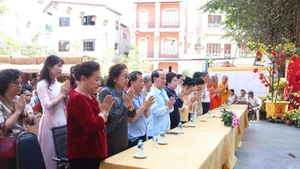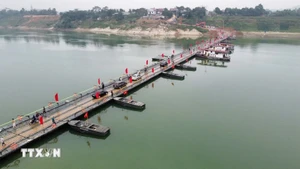To date, 696 social housing projects have been completed or are under implementation nationwide, with around 640 thousand apartments. This number meets only a small part of the population’s demand.
With strong political determination and flexible implementation, many localities have achieved notable results in social housing development. Models that facilitate site clearance, prioritise administrative procedures through a “green channel”, and regularly review progress and resolve bottlenecks at social housing projects in provinces and cities are contributing to realising the scheme’s targets.
Strong mechanisms, clear goals, rapid progress
Hai Phong is currently one of the leading localities in Viet Nam in social housing development. The city has been assigned a target of building 49,400 social housing units by 2030, including 16,555 units for the 2021–2025 period. To date, the city has implemented 17 projects with a scale of around 20,811 units, with an estimated 11,900 units to be completed by the end of 2025. For the entire 2021–2025 period, Hai Phong is expected to complete about 17,291 units, exceeding the plan by 736 units.
This result stems from the city’s comprehensive implementation of decisive solutions. The Hai Phong Party Committee issued a specialised resolution on social housing development until 2030. Based on this, the City People’s Committee detailed programmes and plans with clear roadmaps for each project; incorporated social housing construction progress into annual socio-economic growth scenarios; and put software into operation to monitor each project’s progress weekly and monthly. Departments and sectors have been assigned specific tasks, ensuring accountability in every stage.
In 2025, the city will cut by 50% the time required for administrative procedures related to social housing, intensify site clearance, and create clean land reserves, focusing on areas with synchronised infrastructure.
Le Quy Tiep, Director of the Hai Phong Department of Construction, said the city’s approach is that social housing must be in convenient locations, with good quality and reasonable prices. Small-scale projects are limited, while large-scale social housing urban areas with many amenities are prioritised.
Hai Phong is also studying special financial policies to help social housing buyers access the 120 trillion VND preferential loan package and provide interest-rate support for industrial park workers buying social housing. Currently, seven projects are open for sale, with prices from 12–19 million VND/m² and rental prices from 59,000–84,000 VND/m²/month.
Bac Ninh Province has been assigned the target of completing 15,929 social housing units in 2025 and 135,002 units by 2030. To date, the province has implemented 78 projects, with the completion of 13,689 units, reaching about 86% of the 2025 target. Three ongoing projects are expected to add 2,596 units by the end of 2025, exceeding the target by 356 units. In 2025, the province approved investment policy and assigned investors for 18 new projects, covering nearly 42ha with total capital of more than 23,700 billion VND, which are expected to supply around 16,700 apartments.
Nguyen Tuan Dung, Deputy Director of the Department of Construction, said the province has implemented several breakthrough mechanisms for social housing, such as allowing administrative procedures for social housing projects to apply the “60% green channel” mechanism (reducing processing time by 60%). The province issued a new regulation allowing workers who already have housing but live far from their workplace to receive social housing benefits; and publicised selling prices to ensure transparency. Some notable projects include Social Housing Area No. 2 in the southern urban area (Bac Giang Ward, Tan Tien Ward) with 1,032 units priced at around 18.9 million VND/m²; and the Thong Nhat Smart City Social Housing Project with 1,048 apartments and a townhouse area expected to be completed in December 2026, with apartment prices ranging from over 16.1 million to nearly 16.8 million VND/m².
In 2026, Bac Ninh is assigned a target of completing 17,873 social housing units, but the province has registered 20,000 units, demonstrating strong determination in this field.
From 2021 to 2024, Ha Noi completed more than 11,330 social housing units, accounting for nearly one-sixth of the nationwide figure. For 2025–2030, the Prime Minister has assigned Ha Noi a target of more than 44,860 units, including 4,670 units in 2025 alone. The city has strongly applied the “green channel” mechanism for handling procedures for enterprises, enabling many projects to start early and progress quickly. To date, Ha Noi has five projects which are eligible to supply 4,635 apartments to the market, achieving 94% of the 2025 plan.
Additionally, six projects under construction will provide more than 4,460 units; two other projects have been assigned investors, providing nearly 2,170 units. At the end of 2025, several social housing projects will begin accepting home purchase applications, such as Kim Chung New Urban Area, Kim Hoa Urban Area, and Ha Dinh.
Simultaneous commencement of many projects
Demand for social housing in Dong Nai Province is very high due to the presence of 57 industrial parks with hundreds of thousands of workers. To meet urgent housing needs, on September 27, 2025, the provincial People’s Committee and investors jointly commenced seven projects with more than 7,000 apartments in areas with high concentrations of industrial parks.
Ho Van Ha, Vice Chairman of the Dong Nai People’s Committee, affirmed that the simultaneous start of seven social housing projects demonstrates the province’s strong political determination and the support of enterprises. Between the seven projects implemented by Ha Noi Construction Corporation in An Phuoc Commune, the scale is 3,290 apartments, with total capital of more than 2,240 billion VND, with construction expected to be completed after 30 months. The investor has committed to openness and transparency, ensuring apartments are delivered to the right beneficiaries.
Although implementation is strong, many workers still hope social housing prices will continue to fall to match their payment capacity. Nguyen Thi Hai (Tam Hiep Ward) expressed the desire for stronger support policies so that low-income workers have opportunities to buy homes through long-term instalments, reducing financial pressure.
From 2021 to 2024, Dong Nai completed 2,010 units. Currently, the province is implementing 14 projects with nearly 10,100 units. From 2025 to 2030, the province must complete nearly 65,000 units, including around 4,200 units in 2025.
To date, the province has approved investment policy for 37 projects with 38,000 units and continues to finalise documentation to commence an additional 18 projects between now and the first quarter of 2026. Dong Nai has allocated more than 1,195ha of land for social housing development, essentially ensuring a sufficient land fund to meet the 2030 targets.
As a border province with vibrant economic activity, Lao Cai identifies social housing development as a key task to ensure social security in the locality. Nong Van Quyen, Deputy Head of the Housing and Real Estate Market Management Division (Department of Construction), said the province has supplemented urban planning and industrial zone planning and allocated adequate land for social housing. The province has proactively allocated funding for site clearance; and included in planning essential cultural, sports, medical, and educational facilities so that social housing areas have adequate amenities. The province is also promoting decentralisation, administrative reform, and streamlining procedures for investor selection.
Under the Government’s project, Lao Cai has been assigned a target of 8,300 social housing units by 2030, with 2,228 units to be completed in 2025. However, progress remains slow. Investors are currently rushing to complete three projects with a total of 1,580 units, achieving about 71% of the target, while the remaining units are expected to be completed in 2026. The province aims to complete the entire assigned target by 2030.
















